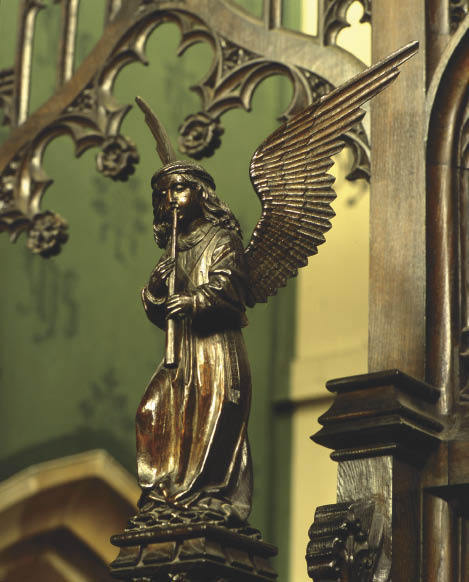The date of George Frederick Bodley’s death (1907) offers a partial explanation for a commemorative exhibition, but ‘comes the hour, comes the man’ also applies, and in this case the man is Michael Hall, the editor of Apollo magazine, who for some years has studied Bodley’s work and succeeded in presenting it as a key to understanding many aspects of the late-Victorian mind, rather than simply as the oeuvre of a skilled but possibly rather conventional designer whose successors followed him into a dead end of style. He is the instigator and curator of this small exhibition in the V&A + RIBA Architecture gallery at the V&A. There is a book coming, but for that we shall have to wait a little longer.
The publication earlier this year of Rosemary Hill’s biography of Pugin has reminded the reading public that architectural ideas in Victorian Britain were primarily played out in the ecclesiastical sphere. Bodley’s career began in 1852, the year of Pugin’s death, and in the 1860s he bucked the trend of French- and Italian-based ‘vigorous’ Gothic when he redesigned All Saints, Jesus Lane, Cambridge, in a more consciously English style that looked back in some ways to Pugin. In contrast to the anxious busyness of his contemporaries, speculating about the true path to architectural righteousness, Bodley let his eyes do the work, making judgments that, while informed by precedent, were ultimately based on his own sense of beauty, hence the exhibition’s title. He set beauty against progress, believing that you must choose one or the other. He was noted for his method of studying old buildings, which in his mature years employed cigars rather than sketchbooks, as he sat contemplating on a tombstone. In this laconic conviction, he resembles another aesthete among ideologues, Mies van der Rohe, in the 20th century.
One reason why Bodley has never previously been sucked into the academic mill is that no central body of documents survives. The exhibition has brought together items from the RIBA and V&A collections, now housed under the same roof, the latter providing rich resources of designs by Morris & Co., with whom Bodley worked in the 1860s before deciding that they were insufficiently biddable and turning to less famous providers for his stained glass and other ornamental work. Other drawings have come from individual churches or local collections associated with them, fulfilling one of the functions of an exhibition, which is to bring together items that need each other for context.
Despite the limitations of the gallery (a poor substitute for the old RIBA Heinz Gallery, but there’s progress for you), the display lives up to its title, with the cases backed by wallpapers designed by Bodley and still in production at Watts of Westminster, the decorating firm of which he was a founder, and which still miraculously flourishes, providing the chief sponsorship for the exhibition and its small printed guide. Following in Pugin’s path, Bodley and his small office designed all the fittings for church and house interiors, and a rich selection of plate and vestments glints in the subdued light. Detailed watercolours of interiors reinforce the association between Bodley and the Aesthetic Movement.
‘In the not very long run, the wages of good taste are death,’ wrote the architect and critic H.S. Goodhart-Rendel in relation to Bodley’s successors in the 20th century. Like many amusing barbs, this was grossly unfair. Michael Hall has not quoted these words, but the second part of the exhibition delivers a convincing refutation, touching on the works of Bodley’s pupils and followers. Walter Tapper, F.C. Eden and Ninian Comper carried forward the cult of beauty as a defence against modernity and as a spiritually compelling form of practice. With the death of Stephen Dykes Bower in 1994, it seemed that this line of continuity was finally broken. Since then, a shining contradiction has arisen to such pessimism, in the form of the completion of St Edmundsbury Cathedral by Dykes Bower’s last pupil, Warwick Pethers of the Gothic Design Practice, whose elevation of the combined 500 years of building on the site hangs beside the work of Bodley and his followers. It is not only a beautiful drawing, but, as I wrote in The Spectator last year, the building is even better. It is sad, therefore, to report that a few months ago, for no very clear reason, the cathedral dismissed Warwick Pethers before the completion of the work with all the embellishments that Dykes Bower and his predecessors would have found indispensable to worship. I can only hope that his skills are better appreciated elsewhere in future.






Comments